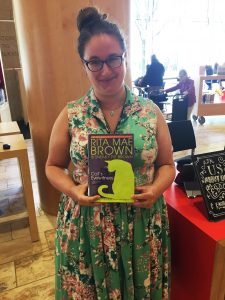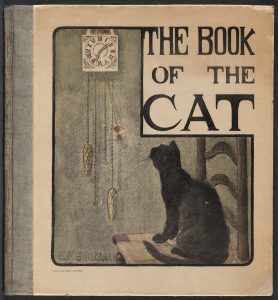Have you ever walked through the library’s mystery section and noticed that there seem to be a lot of books with detectives who are cats, librarians, owners of cute used bookshops, or retired librarians who now own cute bookshops and solve mysteries with their cat? What gives? Are the librarians pushing their biased pro-cat, anti-murder agenda?
Well, yes... but also no. There are lots of factors that go into why we pick the books that we do. Hopefully this helps demystify how we pick mysteries.
Behind the scenes in library world, we think a lot about a concept called “information literacy.” This means thinking about how people decide what information to trust and where good information comes from. This is very important to our jobs here at the BPL. When we order books for the collections, choose digital resources, curate special collections, or do countless other things, we have to know the information we are presenting is as reliable as possible.
Sometimes people think that libraries and books should be “neutral.” It would be nice if our information could be free of bias, preconception, or judgement. Sadly, a core fact of information literacy is that neutrality is impossible. It would be great if there was some grand central bank of utterly true information created by an infallible robot we could use. That doesn’t exist.
What does exist are books and resources made by humans. Messy, biased, beautiful humans. Every author has had a different journey through life, a different set of events that has happened to them. That journey and those events are going to shape how they approach what they write about.

Libraries don’t exist in a neutral void that generates perfect information. We have to choose from among the books that actually exist. We can’t promise neutrality to you, because we would never be able to deliver. If we only picked books that had completely neutral points of view, we would have totally empty shelves.
To guide us in providing reliable information, the BPL has a Collection Development Policy. It outlines how we decide what material to add to the collection. You can look for yourself, and see that the word “neutral” never appears in it. There are a lot of criteria we use, but some of the more important ones are:
- Public demand and anticipated demand
- Relevance to the interest and needs of the community
- Representation of diverse points of view
- Attention of critics and reviewers, award winners, or inclusion in bibliographies
- Reputation or qualifications of the author, creator, or publisher
The librarians who pick the books are human too, with their own perspectives. Those perspectives do include a lot of training on how to evaluate information, but they include the rest of our lives as well. So we don’t worry about being “neutral.” Returning to the mystery section, why do we have so many books where librarians solve the mystery? For a bunch of reasons:
- We can only get books that exist, and lots of mystery authors share our interest in books and cats
- So many books do get published that even we can’t read them all, so we use reviews from trusted sources. They’re often just as invested in books and cats
- For the books that we do read ourselves, we are naturally more likely to select ones we like
- We track how often each book gets checked out, so we know that people who check out mystery books also like cats and librarians
So yes, on some level we pick books because we like them. That is a part of our jobs. We also pick books because you like them, and the people writing the books like them. If there is a perspective that you don’t think we’re representing enough in the collection, please tell us about a book you think we should purchase. We love when people tell us what books they want. It makes our jobs much easier!




Add a comment to: Nobody is Perfect or Neutral — Or, Why Libraries Have so Many Mysteries Where a Librarian Solves the Case